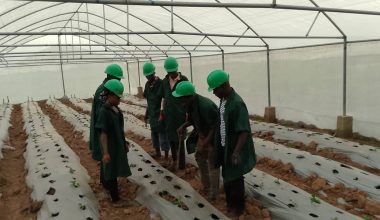The Future of Farming in Nigeria | Trends and Innovations to Watch

The Future of Farming in Nigeria…
Nigeria, with its vast agricultural potential, is on the cusp of a farming revolution. Technological advancements and changing consumer preferences are reshaping the agricultural landscape. This post explores key trends and innovations that will define the future of farming in Nigeria.
The Rise of Precision Agriculture
Precision agriculture, also known as smart farming, involves using technology to optimize agricultural practices. This trend is gaining traction in Nigeria due to its potential to increase yields, reduce costs, and conserve resources. Key components of precision agriculture include:
- GPS Technology: Used to map fields, track equipment, and apply inputs precisely, ensuring optimal use of resources and minimizing waste.
- Drones: Employed for aerial imagery, crop monitoring, and precise application of pesticides and fertilizers, allowing farmers to manage large fields more effectively.
- Soil Sensors: Measure soil moisture, nutrients, and other parameters, enabling farmers to make informed decisions about irrigation and fertilization.
- Yield Monitors: Assess crop performance in real-time, helping farmers optimize future planting decisions and improve overall yield.
- Data Analytics: Analyzes farm data to provide actionable insights, enhancing decision-making and operational efficiency.
The Importance of Technology Adoption
Technology is no longer a luxury for Nigerian farmers but a necessity. From mobile apps to farm management software, digital tools are empowering farmers to improve efficiency and productivity. Key technological trends to watch include:
- Mobile Apps: Provide weather updates, market prices, and agricultural best practices, ensuring farmers have timely information to make better decisions.
- Farm Management Software: Assists in record-keeping, inventory management, and financial tracking, helping farmers streamline their operations.
- E-commerce Platforms: Facilitate direct-to-consumer sales and market access, expanding the reach of farmers to a broader audience.
- Blockchain Technology: Ensures supply chain transparency and traceability, building consumer trust and opening up new market opportunities.
The Growing Demand for Organic and Sustainable Farming
Consumers are increasingly conscious of the environmental impact of their food choices. This growing demand for organic and sustainable products presents a significant opportunity for Nigerian farmers. Key trends in this area include:
- Organic Certification: Obtaining certifications to access premium markets and meet the rising demand for organic produce.
- Agroecology: Combines traditional farming practices with ecological principles, promoting biodiversity and sustainability.
- Bio-inputs: Using organic fertilizers and biopesticides to reduce chemical inputs, improving soil health and reducing environmental impact.
- Carbon Sequestration: Implementing practices to store carbon in the soil, helping mitigate climate change and enhance soil fertility.
Specially Handpicked For You:
- Pest Control with Sticky Traps
- Creating Agricultural Cooperative in Nigeria
- Agricultural Financing for Small and Medium-Scale Farmer
The Role of Youth in Agriculture
Nigeria’s youthful population presents a unique opportunity to revitalize the agricultural sector. Engaging young people in farming requires creating attractive and profitable opportunities. Key initiatives to encourage youth involvement include:
- Agricultural Education: Improving agricultural curricula in schools and universities to equip young people with the necessary skills and knowledge.
- Youth-focused Extension Services: Providing tailored support and resources to young farmers, helping them succeed in the industry.
- Agripreneurship Programs: Fostering entrepreneurial skills and business development among young people, encouraging them to start their own agricultural enterprises.
- Access to Finance: Providing financial support for young farmers, enabling them to invest in modern farming techniques and equipment.
The Potential of Livestock and Aquaculture
While crop production has traditionally dominated Nigerian agriculture, the livestock and aquaculture sectors offer significant growth potential. Key trends in these areas include:
- Livestock Intensification: Improving productivity through better breeds, nutrition, and health management, leading to increased meat and dairy production.
- Aquaculture Expansion: Developing fish farming to meet the growing demand for protein, providing a sustainable alternative to wild-caught fish.
- Value Addition: Processing livestock and fish products to increase returns, creating new market opportunities and reducing post-harvest losses.
- Export Opportunities: Targeting international markets for high-value products, boosting the country’s agricultural exports and earning foreign exchange.
Overcoming Challenges
While the future of farming in Nigeria is promising, several challenges must be addressed to fully realize its potential:
- Infrastructure: Improving roads, electricity, and storage facilities to reduce post-harvest losses and enhance market access.
- Financing: Expanding access to credit for farmers, enabling them to invest in modern farming techniques and equipment.
- Extension Services: Strengthening agricultural advisory services to provide farmers with the knowledge and support they need to adopt new technologies and practices.
- Climate Change: Developing adaptation and mitigation strategies to address the impacts of climate change, ensuring the resilience of the agricultural sector.
The future of farming in Nigeria is bright, with numerous opportunities for growth and innovation. By embracing these trends and addressing the challenges, Nigeria can achieve sustainable agricultural development and ensure food security for its population.
 Greenhouses
Greenhouses










